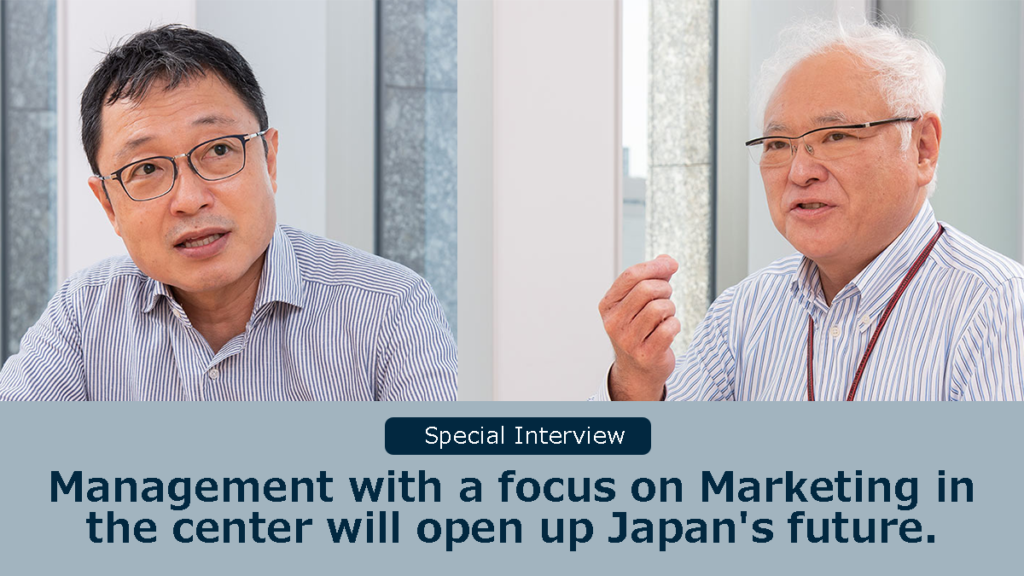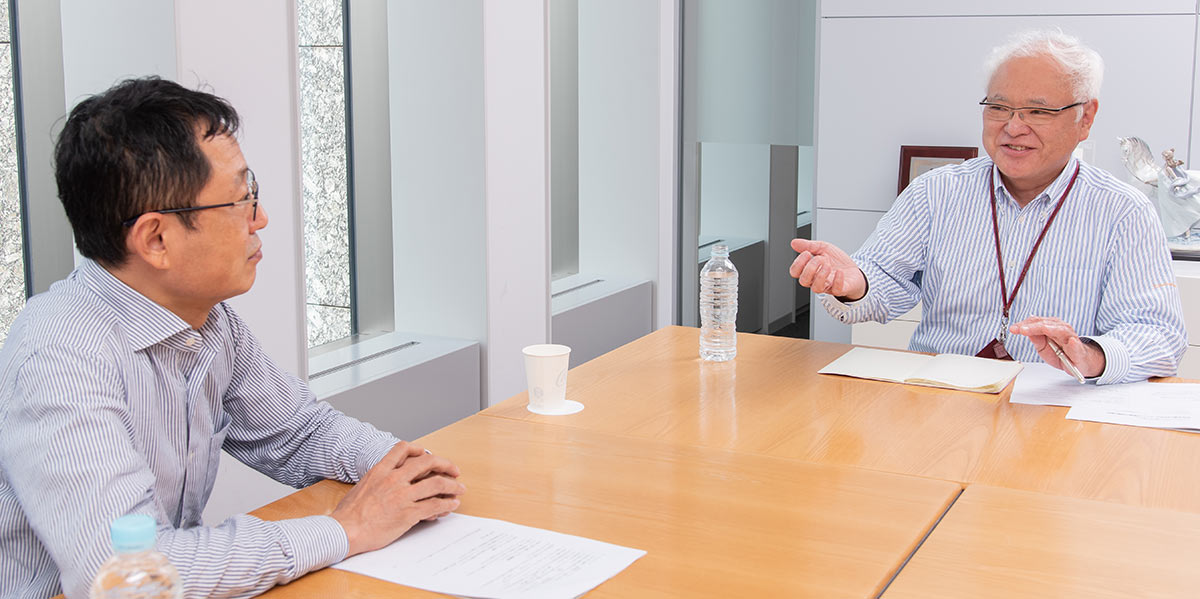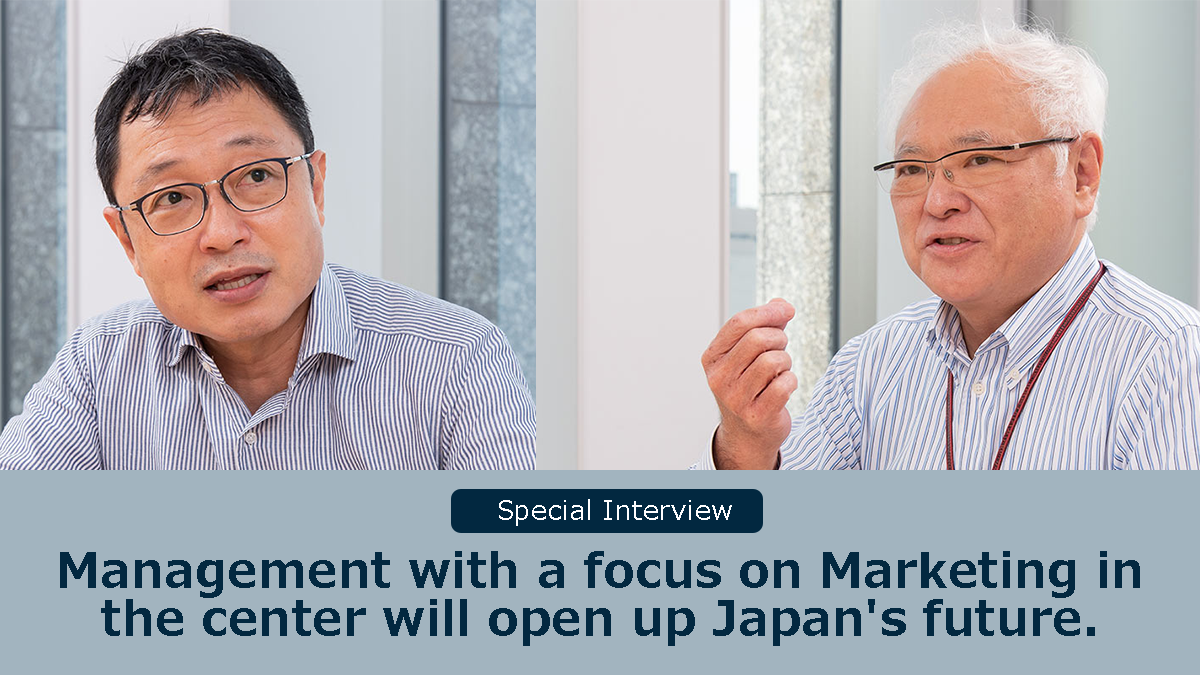transcosmos’ Fukushima invites guests to talk about the latest marketing situation. In this second episode, we hear from Mr. Hiroki Oizumi, Executive Director of JFOODO (Japan Food Overseas Promotion Center), about the challenges and opportunities for the marketing operations of Japanese companies. Mr. Oizumi systematized global marketing operations while holding key domestic and international positions at a major Japanese integrated food company. Since then, he has worked as a marketing manager in contrasting organizations such as foreign companies and government agencies. With his point of view, we will discuss the future after “Marketing 4.0,” including the state of marketing in Japan and abroad, and what Japanese companies should aim to pioneer in the future.
Contents
Top executives of global companies are “marketers”

Fukushima:Having worked as a marketer for both Japanese and global companies, what do you feel are the differences between Japan and other countries? Oizumi:There is a major difference between Japan and other countries in terms of whether the marketing department is a functional or business department. In Japan, exception for some consumer goods companies, marketing departments are generally considered functional divisions, such as research and advertising. Overseas, on the other hand, the marketing department is considered a business department responsible for planning and executing corporate strategies from the perspective of the end consumer.
Oizumi:There is a major difference between Japan and other countries in terms of whether the marketing department is a functional or business department. In Japan, exception for some consumer goods companies, marketing departments are generally considered functional divisions, such as research and advertising. Overseas, on the other hand, the marketing department is considered a business department responsible for planning and executing corporate strategies from the perspective of the end consumer.
After the end of the war, Japan joined the ranks of developed countries, experiencing rapid population and economic growth. During this period, the domestic market was short of goods for a long time, and companies began to place priority on improving production efficiency, and as a result, marketing was neglected. In contrast, global companies overseas, which deal with markets that are more diverse than Japan’s and where the gap between rich and poor is greater than in Japan, could not manage their business without emphasizing marketing. The global companies’ emphasis on marketing is symbolized by the fact that most of the personnel at the top of management have marketing experience in business divisions.
Fukushima:What you just said reminded me of a newspaper ad that P&G once ran in the U.S., using 15 full columns. The ad featured dozens of prominent executives and included the copy “They are all P&G alumni,” expressing the fact that people who studied marketing at P&G have gone on to become top executives of leading companies based on their marketing education. In Japan, top management who came from the marketing field is not necessarily mainstream, especially in traditional and prestigious manufacturers, where most of them seem to have come from the engineering or finance departments.
Oizumi:In addition to top management, there are significant differences in the functions of finance departments between Japan and other countries. In the finance departments of global companies, there is a position called “business controller. Business controllers know to evaluate marketing activities from a financial perspective and are involved in marketing planning by using data, hypotheses, and formulas such as “what measures have worked in the past and how well they have worked in the past. Furthermore, they do not simply work to reduce costs, but also offer advice such as, “If you are halfway there, you should not do it,” or “You should spend more on advertising if you want to achieve your objectives. I feel that the presence of such business controllers supports the high-profit structure of global companies.
Fukushima:I felt when I was working for one of foreign companies, marketing is completely recognized as one skill in foreign countries.
Human resources at global companies calculate “which departments to experience and which marketing skills to acquire in order to further develop their careers,” and they do not hesitate to apply for positions that are considered lower-paying than their current ones at job postings (internal job offers) and other opportunities. This is unthinkable in a Japanese company, where most employees follow orders from the human resources department to rotate through their careers.
Oizumi:What you just said reminded me of the words of my boss at the first company I worked for, “marketing as a job function”. This phrase expresses his concern that while finance and legal skills are recognized as job skills, marketing is not. One of the reasons why marketing is not recognized as a job function is the positioning of marketing operations. In Japanese companies, marketing work is a back-end process of business activities, and the emphasis is placed on advertising and promotion after the manufacturing process is completed. In global companies, marketing is a front-end process of business activities, and they are responsible for the execution of their own plans.
In Japan, branding and naming are also in a different form than they should be because marketing is not positioned as a front-end process. If one takes the view that marketing is a front-end process, branding is done first to clarify the value offered by the brand, and then a new product is created that fits that value. In other words, there is the “name” of the brand, and the brand value accumulates through the release of “products” that keep that promise, thereby increasing loyalty. On the other hand, when marketing is considered a post-process, it tends to end with naming, and putting a name on the finished product. Loyalty can be enhanced by branding, but not by naming. Naming does not.
Fukushima:Since marketing, or value creation, is a procedure, it is a big problem if companies and marketers do not properly understand the true meaning of a brand. Total perceived quality, which includes not only quality and functionality but also design, reliability, and service, is the product value and brand. It is common in Japan that these marketing fundamentals are neglected even in the activities of leading companies.
Japan’s Plot to Outperform the West
Fukushima:It is said that Japan is good at taking in various cultures, but in many cases, Japan is the only country in the world that is different.
In Japan, marketing has been the focus of attention since the 1950s, and we have mainly studied marketing in the United States. Then, in the 1980s, manuals were created by advanced companies, and a Japanese-style marketing platform began to emerge.
However, with the advent of the Internet in the 1990s, the marketing paradigm has changed dramatically, and I feel that Galapagosization is progressing amidst the confusion of “not finding the answer to the fusion of digital and analog” and “not making good use of theories such as 5A advocated by Kotler. Moreover, Japan is the only country that even seems to be missing out on global standards.
Oizumi:On the other hand, I believe that there is a way for Japanese companies to outperform their Western counterparts. In Japan, there is a phrase that describes the stages of training in the world of martial arts and the performing arts: “Shu-ha-ri(守破離),” which means “to break away from the norm”. It is said to have originated from Sen no Rikyu’s admonition, “Observe the rules and regulations of manners and do not forget the book even if you break them.
”Shu(守)” is the stage of thoroughly learning and adhering to the teachings and kata of the school, “ha(破)” is the stage of experimenting and exploring what is not taught in the school, and “ri(離)” is the stage of developing one’s own unique style based on both of these.
In a global company, it is difficult to “ha(破)” or “ri(離),” but rather to be thoroughly “shu(守)”. Each company has its own marketing model to follow, and any deviation from that model is unacceptable. In the same way as when driving a car, you are trained to follow a set of rules, such as “use this car navigation system,” “drive an automatic car instead of a manual car,” “always drive at full speed on a paved route and arrive at your destination at a certain time,” and so on. The local people are trained to follow the rules and are pressured to do so as well. The reality is that it is difficult to draw a concept on a blank sheet of paper and create a market from scratch. At Ajinomoto, the basic approach to overseas market development was to drive a manual car on unpaved roads without a map. The company had to relearn the traditional training in “shu(守)” and then learn new methodologies in “ha(破)” to reach a “ha(破)” situation. I believe that only Japanese companies can do this.
Fukushima:Japan, which does not adhere to “Shu(守),” may be good at flexibly working through difficult situations when confronted with them. However, the lack of “Shu(守),” or ground rules and manuals, can also be a weakness of Japan. If Japan has rules and manuals, it is possible to accumulate knowledge simply by adding changes to them. Accumulate knowledge and data, and turn them into a force for value creation and innovation. From this perspective, Japan has much to learn from the Western style of data-oriented and logical marketing.
“Making Sense” Will Change Marketing in Japan
Fukushima:The fact is that Japan, as a country, has not been able to grow its economy since the bubble period. According to UN statistics, Japan’s GDP growth rate from 2000 to 2018 has been only about 1% positive. This figure is notably poor even among developed countries, and it is outrageous that Japan has not been able to grow this much despite the remarkable technological innovations underway, especially in the IT area. I believe that the reason for this stagnation is Japan’s lack of awareness of marketing. In Japan, there is no ministry in charge of marketing, but in Indonesia, for example, there is a minister with the title of “Marketing” who is responsible for promoting marketing activities that should be undertaken for the future of his country.

Oizumi:There is no future for Japan as an extension of the conventional way. Companies, as well as nations, must conduct marketing at the front end of the business process, create something of value that can create a market, and plan and implement promotions that strongly stimulate demand. In other words, management must put marketing in the middle.
In order to succeed in marketing, which we place in the middle of management, we need to pay more attention to “making sense of it,” which we have neglected in the past, i.e., being rational and understanding its meaning. For example, when setting marketing goals, instead of using abstract Chinese words such as “fostering brand value,” we should define the issue in a way that is easy to understand, using specific Daiwa words such as “increasing the number of people who say they must have this brand,” and then use critical thinking and Layered creative thinking. Furthermore, “making sense” is also about getting away from “prayer marketing,” which seems to think that if you put individual measures under a big goal and wish for the goal to be achieved, it will be achieved. What is needed is not “prayer” but a solid “plan.
Fukushima:Many companies in Japan are engaged in “prayer marketing,” which consists of a series of measures without a systematic chain of actions, without setting KPIs to check the progress toward achieving goals, and without management.
So, where are Japanese companies headed if the top management specifies the process toward the value creation they are aiming for and intervenes in this process while promoting management with marketing in the middle?
Oizumi:What Japanese companies need to do through marketing is to create markets that include foreign demand. Domestic demand is very important, but as Japan’s population continues to decline, we cannot hope for significant growth without focusing on external demand.
Marketing overseas to capture foreign demand. In doing so, we must be careful not to think that “Asia is lagging behind Japan”.
In overseas markets as well, I believe that it is impossible to continuously create new markets and grow business without developing marketing that focuses on the customer journey and emphasizes loyalty, based on an understanding of the industry as a whole and the distribution structure, and by looking at the lifestyles of consumers in each region.
Fukushima:Today, Mr. Oizumi made us think again about “the difference between Japanese and global marketing” and “the marketing that Japanese companies should aim for in order to open up the future. Thank you very much for your valuable talk.
Profile of interlocutors
The Japan Food Products Overseas Promotion Center(JFOODO) General Director Mr. Hiroki Oizumi
After graduating from Waseda University, he joined Ajinomoto Corporation, where he worked in the domestic sales division (including preparation for the revision of the trading system) and the domestic business division (management of all “HON-DASHI” brand products from planning and development to business profitability) before moving to the overseas division. Oversaw the launch of the AJINOMOTO MARKETING MANAGEMENT MANUAL, a common global marketing manual, the AJINOMOTO BRAND SPOON brand model, and annual A&U surveys across major countries. He was assigned to Brazil, where he launched Soup VONO and made it a top brand. He then worked as Marketing Director of Johnson K.K., the Japanese subsidiary of S.C. Johnson, and as Executive Officer and Global Marketing Officer of LIXLL Corporation, before being appointed to the strategic global branding of Japanese agricultural and marine products and food products established by the Japanese government in 2017. He was appointed as the first General Director of JFOODO (Japan Food Overseas Promotion Center), an institution.
transcosmos inc. Senior Executive Officer
Tsunehiro Fukushima
Mr. Fukushima completed his graduate studies at Tokyo Institute of Technology in 1982. He developed a market definition model using multivariate analysis at Ajinomoto Co., Ltd. and was in charge of marketing for the development of new household products and new business development in the marketing department, as well as a large-scale manufacturing and sales alliance with a convenience store chain. Later, he worked for GE Capital, Mitsubishi Corporation, Gurunavi, and Medical Data Vision, where he was in charge of big data business and digital marketing. As of 2020, he is in charge of marketing-related business development as a Senior Executive Officer of transcosmos inc.

